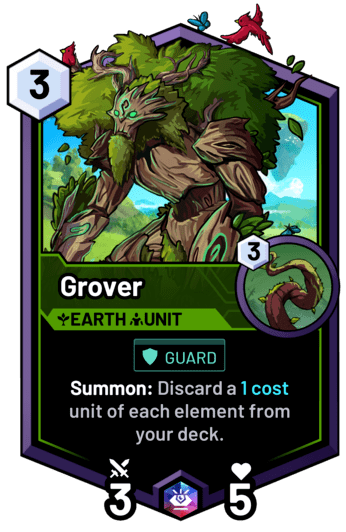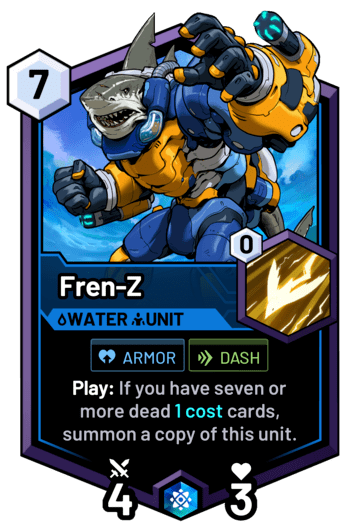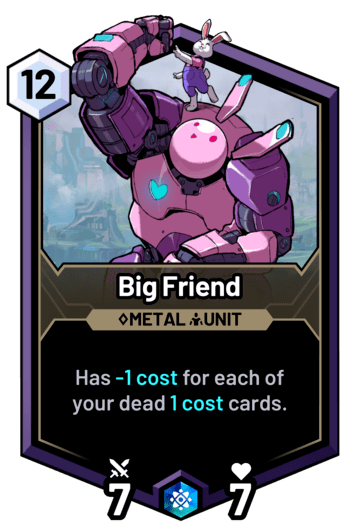Deck Tech: Banjo Grover
- Greg Valle
- Oct 13, 2022
- 4 min read
Updated: Oct 13, 2022
Introducing Grover, the one-stop combo shop, that transforms your deck into a collection of powerful spells benefiting from its game-warping affect. Banjo Grover takes advantage of this marquee unit to go over the top of its opponents early and consistently.


The Deck:
Grover, our decks namesake card, tosses 1 unit of each element (8 in total) into the graveyard when it comes into play which enables two things; cards that care about the number of elements in your graveyard, and cards that care about the number of 1 cost units there. We have a number of payoffs to take advantage of these conditions, but with a deck so all-in on a single strategy, its most important to know how to initiate it first. Banjo Grover has several sequences to get Grover into play as fast as possible. In priority;
Cast in Chrome for 3 (replacing Grovers pre-attached Roots with Lead, so it can attack your next turn)
Grover in the starting hand
Ari's Insight for 3, drawing Grover
Ari's Insight / Eldritch Lore for 0, drawing / attaching Cast in Chrome. (While in the deck X spells count as a mana cost of 0, so we take advantage of that here)
Cobalt attaching Cast in Chrome (it will always be the lowest costing Metal spell in your deck at 0)
Cast in Chrome takes priority over summoning Grover normally, as giving Grover lead so that it can attack can make for some explosive starts. With these sequences, we can play Grover by turn 3 almost every time. That's where the fun begins.
With 1 of each element in our graveyard, Skychannel draws us 2 cards for 0 mana, and Sky Pheonix has a second life by default. Most importantly, though, World Tree summons an 8/9 Elderwood for just 4 mana. It's helpful to have ways to clear Roots from the massive Elderwood and Tactician or Water Rune work great for that. If you didn't end up using Eldritch Lore to search for Grover, it'll grab World Tree for 4 mana every time.
On another spectrum, we play two cards that care about the number of 1 costs in the yard. With the 8 cards that Grover puts there, Big Friend costs just 4 mana for a 7/7, and Fren-Z is guaranteed to summon a copy. Between these payoffs, the goal of Banjo Grover is to play World Tree or Big Friend on the turn following Grover, followed by 2-3 turns of pressing your inherent advantage, and then casting Fren-Z or Sky Pheonix to put the game out of reach.
The rest of the deck is full of a variety of 1 cost units that range from actively useful to actively filler for Grover. The more important ones to keep an eye out for are Hax, Tactician, and Matchstick. Hax adds Unophobia to the deck on death which also synergizes well with the deck's gameplan, Tactician offers a cheap way to clear roots from your World Tree or Grover, and Matchstick is cheap removal on a stick in the early game.
The Match-ups:
The general strategy of Banjo Grover hardly changes depending on the matchup, so there's not much to consider beyond playing Grover as fast as possible. The strategy doesn't have much deviation, but we can play some tech to deal with harder matchups. Enigma Golem into Mass Confusion is a reliable combo to clear the board and leave a giant threat behind, and Bogi-Bogi steals a run-away Mechshroom or Elderwood in the mirror. The bulk of the deck is all in on the Grover Combo, whether searching it out or benefiting from it, so there's not much room for tech that is match-up specific. In all we've got about 5 flex slots to work with, which isn't a lot. In this list we've got Enigma Golem + Mass Confusion combo to clear any boards late game, a smattering of early game removal, and Nomad to draw into Sky Phoenix. Enigma Golem can also grab Unophobia in the late game which can win out of nowhere.
Because the deck is so all-in on the Grover game plan, it suffers if your opponent has easy answers to deal with the big threats like World Tree, but if you can stick one or two of the Grover Payoffs, you should coast to victory.
For Mulligans you want to make sure you have a way to cast Grover as early as possible. If given the option between Grover and Cast in Chrome, pick the spell and send Grover back to your deck. Other than that, World Tree takes second priority, followed by various 1 cost units to clean up anything your opponent might play on turn 1, with Matchstick being the best in that arena.
Conclusion:
If you like combo decks and doing broken things, Banjo Grover is for you. It comes out fast and consistently, and doesn't really care about what the opponent is doing, making it a solid choice in an open field or un-established metagame. It's a fun deck to pilot that can feel linear at times, and absolutely busted when things go right.
Thanks for reading, stay tuned for more deck techs in the future!
Cheers
















Comments